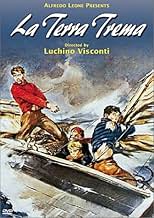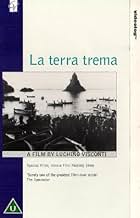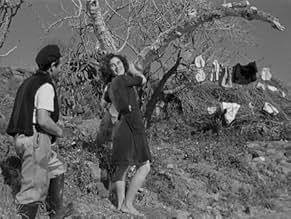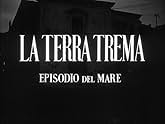Dans la Sicile rurale, les pêcheurs sont à la merci de cupides grossistes. Une famille risque tout pour acheter son propre bateau et travailler de manière indépendante.Dans la Sicile rurale, les pêcheurs sont à la merci de cupides grossistes. Une famille risque tout pour acheter son propre bateau et travailler de manière indépendante.Dans la Sicile rurale, les pêcheurs sont à la merci de cupides grossistes. Une famille risque tout pour acheter son propre bateau et travailler de manière indépendante.
- Director
- Writers
- Stars
- Prix
- 1 victoire et 1 nomination au total
Luchino Visconti
- Narrator
- (voice)
- (uncredited)
Antonio Pietrangeli
- Narrator
- (voice)
- (uncredited)
Antonio Arcidiacono
- Ntoni
- (uncredited)
Giuseppe Arcidiacono
- Cola
- (uncredited)
Venera Bonaccorso
- La vecchia che ride
- (uncredited)
Nicola Castorino
- Nicola
- (uncredited)
Rosa Catalano
- Rosa
- (uncredited)
Rosa Costanzo
- Nedda
- (uncredited)
Alfio Fichera
- Michele
- (uncredited)
Carmela Fichera
- La baronessa
- (uncredited)
Agnese Giammona
- Lucia
- (uncredited)
Nelluccia Giammona
- Mara
- (uncredited)
Ignazio Maccarone
- Maccarone
- (uncredited)
Giovanni Maiorana
- Un bambino
- (uncredited)
Antonino Micale
- Vanni
- (uncredited)
Maria Micale
- La madre
- (uncredited)
Avis en vedette
It's hard to believe that I am the first person to comment on this masterpiece at this website. One reason could be that it's not that easy to see. Thank God for Turner Classic Movies, which is where I finally saw it. I'm happy to see that there's a DVD available.
This is one of those amazing films that uses only non-professionals and in which they perform as well, if not better, than any professional could. The actors are the inhabitants of a small Sicilian fishing village. The film is cliche-ridden (the Marxist variety) and at times predictable. I didn't care about any of this. The film is a true epic about a few people trying to break out of their rut of exploitation and the wretchedness of their everyday living, and failing. The film thus achieves the status of true tragedy. This one shouldn't be missed.
This is one of those amazing films that uses only non-professionals and in which they perform as well, if not better, than any professional could. The actors are the inhabitants of a small Sicilian fishing village. The film is cliche-ridden (the Marxist variety) and at times predictable. I didn't care about any of this. The film is a true epic about a few people trying to break out of their rut of exploitation and the wretchedness of their everyday living, and failing. The film thus achieves the status of true tragedy. This one shouldn't be missed.
Although it was supposed to be a documentary, Visconti put in a slight story line to achieve what a documentary would have done, AND MORE. --He used no professional actors, just native Sicilian fishermen, and other villagers, to play all parts. -- The film uses no artificial lighting, no sound enhancement, sound-effects, or dubbing. -- It was filmed on location in, and around, the crumbling homes of the poor villagers, and it was recorded in the Sicilian dialect (rather than proper Italian), and although it has a documentary "look", Visconti shows the exploitation of the poor by the capitalist middlemen so much more effectively than any documentary could have done.
-- Also, while not the first neo-realist film of that post-war Italian genre, this was the first film to be described by the term: "neo-realist". --A brilliant film on all counts. I rated it "10".
-- Also, while not the first neo-realist film of that post-war Italian genre, this was the first film to be described by the term: "neo-realist". --A brilliant film on all counts. I rated it "10".
This moving slice of life has several acts and moves like an opera, but the scenes are "neo-realistic" in the best sense.
All of Visconti's actors are from the Sicilian fishing village, but they were not acting--just portraying their lives. You care about these real people!
Family is everything--and it survives despite the buffeting by the storms, the stranglehold of the oligarchical wholesalers, and shortsightedness of the townspeople. We see the exploitation of the fishermen vividly and how most accept it as "God's will."
It also brings to mind the old joke: What is the difference between capitalism and communism? Capitalism is the exploitation of man by man, and communism is just the reverse.
All of Visconti's actors are from the Sicilian fishing village, but they were not acting--just portraying their lives. You care about these real people!
Family is everything--and it survives despite the buffeting by the storms, the stranglehold of the oligarchical wholesalers, and shortsightedness of the townspeople. We see the exploitation of the fishermen vividly and how most accept it as "God's will."
It also brings to mind the old joke: What is the difference between capitalism and communism? Capitalism is the exploitation of man by man, and communism is just the reverse.
1. This movie is likely to excruciate those who are not used to reading fast, because the images are too great to be sacrificed for subtitles. Even most of the Italian-speaking people have a hard time understanding this Sicilian accent.
2. The other reason why La terra trema is found boring by many is that reality matters much more than drama to the neorealist director Luchino Visconti. So the audience shouldn't be passive while seeing some real lives going on, that is the only way to feel engaged.
3. The most notable advantage of the movie comes to attention right here. It is touching without bending over backwards for that purpose. You can feel connected to it and at the same time wonder where all that connection comes from. (The movie does not try hard to make you feel this way) It shakes your deepest emotions simply because all it has to do with is the reality of a human society, and also with the real nature for that matter.
4.Another important point here is Visconti doesn't let the fact that he believes in Socialism affect the reality of what he is portraying. The hammer and sickle on the wall in no way seems anything other than part of a neutral report. He reminds us of those journalists who succeed in providing us with an unbiased report regarding a massively resented dictator when we are pretty sure the journalist hates the dictator as much as we do.
5. All in all this is a great picture , of course it requires active audience who know what they want to get from the almost sheer reality pictured.
2. The other reason why La terra trema is found boring by many is that reality matters much more than drama to the neorealist director Luchino Visconti. So the audience shouldn't be passive while seeing some real lives going on, that is the only way to feel engaged.
3. The most notable advantage of the movie comes to attention right here. It is touching without bending over backwards for that purpose. You can feel connected to it and at the same time wonder where all that connection comes from. (The movie does not try hard to make you feel this way) It shakes your deepest emotions simply because all it has to do with is the reality of a human society, and also with the real nature for that matter.
4.Another important point here is Visconti doesn't let the fact that he believes in Socialism affect the reality of what he is portraying. The hammer and sickle on the wall in no way seems anything other than part of a neutral report. He reminds us of those journalists who succeed in providing us with an unbiased report regarding a massively resented dictator when we are pretty sure the journalist hates the dictator as much as we do.
5. All in all this is a great picture , of course it requires active audience who know what they want to get from the almost sheer reality pictured.
Luchino Visconti's vivid portrayal of the grinding poverty endured by Sicilian fishermen under the oppressive rule of grasping wholesalers is a relentlessly grim saga that casts an unflattering light on the crowd's blind propensity to condemn those who strive to rise above their lot in life. Depressing stuff, but hugely compelling in spite of its lengthy running time.
Le saviez-vous
- AnecdotesThe cast was exclusively composed of non-professional actors. They were genuine fishermen and inhabitants of Aci Trezza (Sicily). The credits do not name any of the actors, who are collectively listed as "Pescatori Siciliani" (Sicilian Fishermen).
- Citations
Title Card: [in Italian] In Sicily, Italian is not the language of the poor.
- Autres versionsWas originally released without Italian narration, but it flopped because the Italian audience could not understand the Sicilian dialect. Visconti re-released it with his own narration, which many find detracts from the film.
- ConnexionsEdited into Bellissimo: Immagini del cinema italiano (1985)
Meilleurs choix
Connectez-vous pour évaluer et surveiller les recommandations personnalisées
- How long is La Terra Trema?Propulsé par Alexa
Détails
- Durée
- 2h 40m(160 min)
- Couleur
- Rapport de forme
- 1.37 : 1
Contribuer à cette page
Suggérer une modification ou ajouter du contenu manquant






















